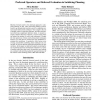Free Online Productivity Tools
i2Speak
i2Symbol
i2OCR
iTex2Img
iWeb2Print
iWeb2Shot
i2Type
iPdf2Split
iPdf2Merge
i2Bopomofo
i2Arabic
i2Style
i2Image
i2PDF
iLatex2Rtf
Sci2ools
AIPS
2009
2009
Preferred Operators and Deferred Evaluation in Satisficing Planning
Heuristic forward search is the dominant approach to satisficing planning to date. Most successful planning systems, however, go beyond plain heuristic search by employing various search-enhancement techniques. One example is the use of helpful actions or preferred operators, providing information which may complement heuristic values. A second example is deferred heuristic evaluation, a search variant which can reduce the number of costly node evaluations. Despite the wide-spread use of these search-enhancement techniques however, we note that few results have been published examining their usefulness. In particular, while various ways of using, and possibly combining, these techniques are conceivable, no work to date has studied the performance of such variations. In this paper, we address this gap by examining the use of preferred operators and deferred evaluation in a variety of settings within best-first search. In particular, our findings are consistent with and help explain the...
AIPS 2009 | Artificial Intelligence | Heuristic | Heuristic Forward Search | Search-enhancement Techniques |
| Added | 08 Nov 2010 |
| Updated | 08 Nov 2010 |
| Type | Conference |
| Year | 2009 |
| Where | AIPS |
| Authors | Silvia Richter, Malte Helmert |
Comments (0)

